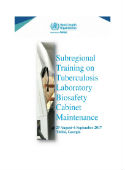Subregional training on tuberculosis laboratory biosafety cabinet maintenance. Tbilisi, Georgia 29 August–6 September 2017

Download
The aim of subregional training on tuberculosis laboratory biosafety cabinet maintenance is to enhance the capacity of qualified technicians and engineers to service biosafety cabinets (BSCs) in the region. Tuberculosis (TB), and particularly multidrug-resistant TB, are still a problematic issue in many countries of the WHO European Region. Laboratory diagnosis is of key importance for detection and treatment of TB. Properly equipped and maintained laboratories should be available for this purpose.
Laboratory BSCs are intended to protect laboratory operators, products and the environment from harmful airborne agents. Their proper functioning and maintenance are key factors in attaining high safety levels and providing laboratory quality assurance. One of the major challenges that prevents the countries concerned from meeting this goal is a lack of qualified and trained technical personnel who can provide professional installation, field testing and maintenance of BSCs.
In order to build national and regional capacity in TB laboratory BSC maintenance, the WHO Regional Office for Europe organized a subregional training session for technicians and engineers from selected countries (Georgia, Azerbaijan and Ukraine) in Tbilisi, Georgia, which ran from 29 August to 7 September 2017. This training was a follow-up to a similar session previously organized for Armenia, Belarus and the Republic of Moldova, which took place in Yerevan, Armenia, between 26 September and 5 October 2016.



